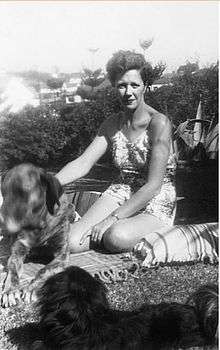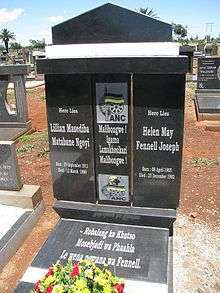Helen Joseph
| Helen Beatrice Joseph | |
|---|---|
 Helen Joseph 1941 | |
| Born |
8 April 1905 Easebourne near Midhurst, West Sussex, England |
| Died |
25 December 1992 (aged 87) Johannesburg, South Africa |
| Resting place | Avalon Cemetery |
| Nationality | South African |
| Occupation | anti-apartheid activist |
Helen Beatrice Joseph (née Fennell) (8 April 1905 – 25 December 1992) was a South African anti-apartheid activist.[1] Born in Sussex, England. Helen graduated with a degree in English from the University of London in 1927, and then departed for India where she taught for three years at Mahbubia School, a school for girls in Hyderabad. In about 1930 she left India for South Africa. She settled in Durban where she met and married dentist Billie Joseph.[2]
Early life
Helen Joseph was born Helen Beatrice May Fennell in 1905 in Easebourne near Midhurst, West Sussex, England, the daughter of a government Customs and Excise officer, Samuel Fennell.[3] In 1923 she was admitted to the University of London to study English, and she graduated from King's College London in 1927. After working as a teacher in India for three years, Helen came to South Africa in 1931, where she met and married a dentist, Billie Joseph. She served in the Women's Auxiliary Air Force during World War II as an information and welfare officer. After the war and her divorce she trained as a social worker and started working in a community centre in a Coloured (mixed race) area of Cape Town.[4]
Later life

In 1951 Helen first met Solly Sachs, when she applied for the job of Secretary-Director of the Medical Aid Society of the Transvaal Clothing Society. At the time Solly Sachs was the head of the Garment Workers' Union.[5]
She was a founder member of the Congress of Democrats, and one of the leaders who read out the clauses of the Freedom Charter at the Congress of the People in Kliptown in 1955. Appalled by the plight of black women, she played a pivotal role along with Lillian Ngoyi in the formation of the Federation of South African Women and with the organisation's leadership, spearheaded a march of 20,000 women to the Union Buildings in Pretoria to protest against pass laws on August 9, 1956. This day is still celebrated as South Africa's Women's Day.[4]
The treason trial and house arrest
Joseph’s opposition to the State had not gone unnoticed, she was a defendant at the 1956 Treason Trial. Justice Rumpff stated: "On all the evidence presented to this court and on our findings of fact, it is impossible for this court to come to the conclusion that the African National Congress has acquired or adopted a policy to overthrow the state by violence, that is, in the sense that the masses had to be prepared or conditioned to commit direct acts of violence against the state."
Although Joseph was arrested on a charge of high treason in December 1956, then banned in 1957. The treason trial dragged on for four years and she was acquitted in 1961. In spite of her acquittal, on 13 October 1962, Helen became the first person to be placed under house arrest under the Sabotage Act that had just been introduced by the apartheid government. She narrowly escaped death more than once, surviving bullets shot through her bedroom and a bomb wired to her front gate. Her last banning order was lifted when she was 80 years old.[4]
In his submission to the Truth and Reconciliation Commission, secret service operative Paul Erasmus stated that from about 1978 till late in the 1980s he and his colleagues on many occasions damaged the property of Mrs Joseph by throwing stones through the windows of her house, made telephone threats, fired shots at the house but did not intend to injure any person, ordered and caused unwanted supplies to be delivered at her house, poured paint remover over her motor car as well as a motor car of Ann Hughes when the latter visited her. The apartheid state’s fear of her was puzzling: “How a weary old girl, an ou tannie like me can be a threat to state security only they can say.” Joseph is quoted.[6] From the late 1970s Christmas Day was “Open Day” at Helen Joseph’s house. Those involved in the anti-apartheid struggle had an open invitation to visit her home. All comrades brought food, and at 12 noon everyone raised their glasses to those on Robben Island (and apparently the Robben Islanders were aware of the ritual). On December 25, 1992, Joseph was in hospital and the venue moved to 11 Plantation Road, The Gardens. Robben Island’s prisoners had been released, and those present raised their glasses to Helen, who would die shortly thereafter.[7][8]
Personal life
“On 31 December 1956 I moved into my little cottage with the tall trees, delighted to have a home of my own . . .” — Joseph quoted in 1986. The cottage was 35 Fanny Avenue, and moving into it in December 1956 was an act of faith and optimism as Helen had been arrested just days before that, charged with treason, and would be on trial for four harrowing years. It is tempting to speculate that Helen Joseph chose to live in Norwood as two of her struggle comrades (Bram Fischer in Oaklands, and Violet Weinberg in The Gardens) lived in close proximity to the suburb. Whatever the reason for her choice of home, she would conduct her struggle against injustice from this address until her death in 1992. Banned four times, jailed four times, she saw her life become a long saga of police persecution, much of it spent under house arrest.
Helen had no children of her own, but frequently stood in loco parentis for the children of comrades in prison or in exile. Among the children who spent time in her care were Winnie and Nelson Mandela's daughters Zinzi and Zenani and Bram Fischer's daughter, Ilsa.
Legacy and honors
- She was admitted to the Order of Simon of Cyrene in 1992, this is the highest honour the Anglican Church of Southern Africa bestows on its lay members of the church who have provided outstanding service.[9]
Places named after her include the former Davenport Road in Glenwood, KwaZulu-Natal, the Helen Joseph Hospital in Johannesburg, a student residence at Rhodes University, Grahamstown and a road in Rustenberg. The Road Name Change Act was initiated by the South African government in 2007 to rename streets, such as Davenport Road, that have names linked to pre-1994 colonialism.
Helen Joseph died on the 25 December 1992 at the age of 87.
Published works
- If this be Treason. London: Andre Deutsch. 1963. ISBN 978-0-620-22197-9.
Helen Joseph's Dramatic Account of the Treason Trial, the Longest in South Africa's History and One of the Strangest Trials of the 20th Century
- Tomorrow's Sun. New York: John Day Company. 1967.
a smuggled journal from South Africa
- Side by Side: The Autobiography of Helen Joseph. New York: William Morrow & Co. 1986. ISBN 978-0-688-07103-5.
See also
Notes and references
- ↑ Van Wyk 2003.
- ↑ http://www.independent.co.uk/news/people/obituary-helen-joseph-1565649.html
- ↑ Frederikse, Julie. The Fought for Freedom: Helen Josephs. Cape Town: Maskew Millar Longman. p. 1. ISBN 0636022404.
- 1 2 3 Rappaport 2001, p. 344.
- ↑ Joseph, Helen (1986). Side by side. Johannesburg: AD. Donker Publishers. p. 249. ISBN 0-86852-196-5.
- ↑ http://sabctrc.saha.org.za/hearing.php?id=59512&t=&tab=hearings
- ↑ http://www.sahistory.org.za/people/helen-joseph
- ↑ //www.sahistory.org.za/topic/treason-trial-1956-1961
- ↑ "Historical Papers, Wits University". historicalpapers.wits.ac.za. Retrieved 2015-04-01.
- Van Wyk, Chris (2003). Helen Joseph. Awareness Publishing. ISBN 978-1-919910-76-5.
- Rappaport, Helen (2001). Encyclopedia of Women Social Reformers. ABC-CLIO. ISBN 978-1-57607-101-4.